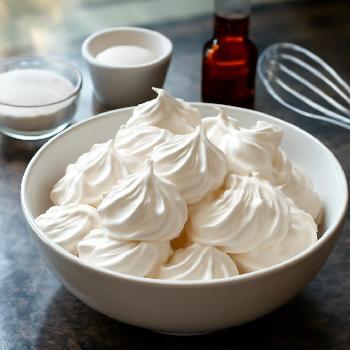Desserts > Dessert Techniques > Baking Techniques > Whipping Egg Whites (Meringues, Cakes)
Classic French Meringue
Learn the secrets to creating a stable and glossy French meringue, ideal for topping pies, making cookies, or incorporating into cakes. This technique focuses on the precise balance of sugar and egg whites to achieve a light and airy texture.

Ingredients
- 4 large Egg Whites
- 1/2 cup Granulated Sugar
- 1/4 cup Powdered Sugar
- 1/4 teaspoon Cream of Tartar
- 1/2 teaspoon Vanilla Extract
Preparing the Egg Whites
Start with cold egg whites. This helps them whip up more easily and achieve greater volume. Ensure your bowl and whisk are impeccably clean and grease-free, as any trace of fat will prevent the whites from stiffening. Wipe them down with lemon juice or vinegar for extra assurance.
Initial Whipping
Place the egg whites and cream of tartar in the clean bowl of a stand mixer (or use a hand mixer). Begin whipping on medium speed until soft peaks form. These peaks should be soft and droopy.
Adding the Sugar
Gradually add the granulated sugar, one tablespoon at a time, while continuing to whip on medium speed. Allow each addition of sugar to dissolve before adding the next. This slow addition helps create a stable meringue.
Stiff Peaks
Increase the mixer speed to medium-high and continue whipping until stiff, glossy peaks form. The meringue should hold its shape when the whisk is lifted. Be careful not to overwhip, as this can make the meringue dry and grainy.
Finishing Touches
Gently fold in the powdered sugar and vanilla extract. This helps to stabilize the meringue and add flavor. Mix until just combined; avoid overmixing.
Using the Meringue
The meringue is now ready to be used. You can spread it on top of a pie and bake until golden brown, pipe it into cookies and bake at a low temperature until dry and crisp, or fold it into a cake batter to add lightness and volume.
Nutrition Facts Estimated per 100g of product
Note: Nutritional information is an estimate and will vary based on specific ingredients and portion sizes.
Calories: ~250 kcal
Protein: ~3g
Fat: ~0g
Carbohydrates: ~60g
Sugar: ~60g
Other Important Considerations for Nutrition
Meringues are primarily sugar, so moderation is key. They are naturally low in fat, but the high sugar content should be considered, especially for those managing blood sugar levels. Consider using sugar substitutes in moderation for a lower calorie option, but be aware that this may affect the texture and stability of the meringue.
FAQ
-
Why is my meringue grainy?
Grainy meringue is often caused by undissolved sugar. Make sure to add the sugar gradually and allow each addition to dissolve before adding more. Overwhipping can also contribute to a grainy texture. -
My meringue is weeping; what did I do wrong?
Weeping (or beading) is when liquid pools on the surface of the meringue. This can happen if the meringue is underbaked, if there is too much moisture in the air, or if the sugar wasn't fully dissolved. Make sure to bake the meringue thoroughly and use a recipe with a proper sugar-to-egg white ratio. -
Can I make meringue in humid weather?
Humid weather can make it challenging to make meringue. The moisture in the air can prevent the meringue from drying properly. If possible, make meringue on a dry day. You can also try using a dehumidifier in your kitchen.
